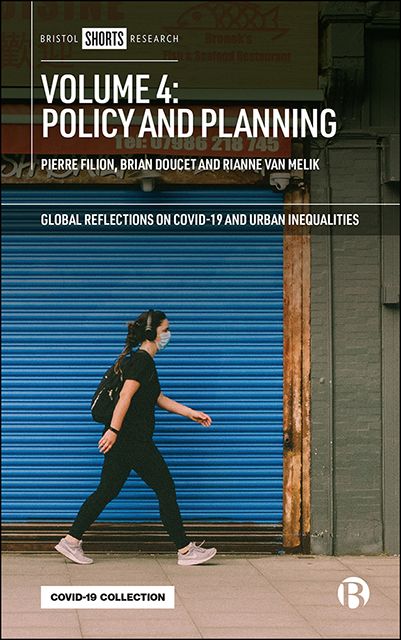Book contents
- Frontmatter
- Contents
- List of Figures and Tables
- Notes on Contributors
- Acknowledgments
- Preface to All Four Volumes of Global Reflections on COVID-19 and Urban Inequalities
- One Introduction: Policy Making in the Face of Uncertainty and Inequality
- Part I COVID-19 and Urban Changes
- Part II The Pandemic, Social Inequality, and Mobilization
- Part III Municipal and Urban Policy Responses
- Index
Twelve - Resisting Disaster Capitalism During COVID-19 in Chile: People Fight Back
Published online by Cambridge University Press: 25 April 2023
- Frontmatter
- Contents
- List of Figures and Tables
- Notes on Contributors
- Acknowledgments
- Preface to All Four Volumes of Global Reflections on COVID-19 and Urban Inequalities
- One Introduction: Policy Making in the Face of Uncertainty and Inequality
- Part I COVID-19 and Urban Changes
- Part II The Pandemic, Social Inequality, and Mobilization
- Part III Municipal and Urban Policy Responses
- Index
Summary
Introduction
The chapter aims to identify and analyze efforts of communities and civil society in general to resist disaster capitalism during COVID-19 in Chile, highlighting the importance of social cohesion for coping with public health crises and other hazards in vulnerable socio-territorial contexts.
Here, disaster capitalism is conceptualized as an approach adopted by the corporate class and governments to profit from disasters such as COVID-19 by introducing neoliberal reforms or underpinning the existing status quo (Klein, 2008; Sandoval et al, 2020).
Through a comprehensive review of several sources including social networks, academic articles, governmental reports, and other gray literature, resistance responses are explored in light of socio-spatial inequalities experienced in urban areas.
Structural inequalities as root causes of discontent, the context of COVID-19 in Chile
The COVID-19 pandemic started to hit Chile in March 2020 during a social crisis caused by massive discontent due to the deployment over decades of an economic development model that has deepened gaps among socially and territorially segregated populations. The model increased the socioeconomic fragility of a large percentage of urban inhabitants who not only lacked the minimum income to survive in better times, but who in many cases lost their informal sector jobs due to the crisis.
Since then, COVID-19 has further exposed the structural inequalities of a system in which key elements of social welfare are privatized, where 70 percent of current pensions are less than the minimum wage (410 USD), while the private companies that run the system made profits of USD 236 million during the first semester of 2020.
Chile is a highly centralized country with great territorial disparities between regions, between rural and urban areas, and between urban zones. The Metropolitan Region of Santiago (MR), with Santiago as the national capital, concentrates 40.5 percent of the country's population and 42.5 percent of the national GDP. Among the urban communes that form Santiago City, life expectancy varies by up to 11 years depending on the area, which is directly associated with the socio-economic status of the population (Valiente Deichler, 2019). The differences in life expectancy for women are much higher. It varies by as much as 18 years depending on the communes where they live (Bilal et al, 2019).
- Type
- Chapter
- Information
- Volume 4: Policy and Planning , pp. 121 - 132Publisher: Bristol University PressPrint publication year: 2021

